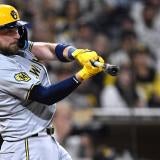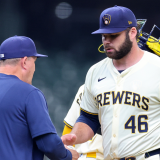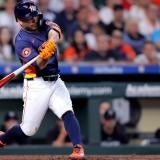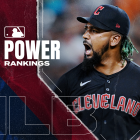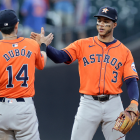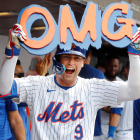Leading up on the announcement of the Baseball Hall of Fame class of 2017 on Jan. 18, we're examining each of the 34 candidates on this year's BBWAA ballot. By way of reminder, a candidate must be named on at least 75 percent of submitted BBWAA ballots in order to be elected into the Hall of Fame.
We've already looked at the numerous candidates who are certain to fall off the ballot after only one year (candidates receiving less than five percent drop off the ballot). Now we're looking at those hopefuls who figure to have meaningful support and perhaps even earn induction at some point.
Up this time around is a man whose body of work in Major League Baseball has become underrated in my view: Sammy Sosa.
It's amazing that this is even possible, given that it could have been argued throughout his career that his gaudy home run totals actually made him overrated as an all-around performer.
Yet here we are, with Sosa flailing toward the bottom of the Hall of Fame ballot in this, his fifth try. He got just seven percent of the vote last season and the ballot is just as crowded. Three names came off, but Ivan Rodriguez, Vladimir Guerrero and Manny Ramirez came on. Sosa has gained three net votes as of Thursday, according to Ryan Thibodaux's tracking spreadsheet, and appears on just over 11 percent of the 135 logged ballots.
Sosa is a case on the surface that seems simple. The common belief is he'd easily be in by now if most people believed he did his work without the help of performance-enhancing drugs. I think it's more complicated than that, though, specifically when it comes to his low vote totals.
Most of the discussions of the "PED" guys on the ballot center around Barry Bonds, Roger Clemens and Ramirez. Some people connect Jeff Bagwell and/or Rodriguez to PEDs via mental gymnastics in order to leave them off. All the while, we barely hear a whimper about Sosa. There seem to be four clear reasons:
1. He used a corked bat and got caught.
So this establishes that Sosa was capable of cheating and makes the PED suspicions seem well-founded to some. He said he used that bat for batting practice in showman-like fashion for the fans and only grabbed it for the game by accident. That sounds like a lie and a pretty lame one at that. This didn't help his body of work.
2. His performance in front of Congress. To many people, him declining to speak English while he would often do so quite well in interviews was a way of avoiding lying or telling the (most likely unfortunate) truth. There was a statement saying he didn't use PEDs, but it was read by his attorney.
3. His bad departure from the Cubs. The Cubs collapsed in 2004 and missed the playoffs after a deep playoff run the previous season. Sosa slumped in the second half (.233/.300/.478 after a .279/.372/.567 first half) and then left during the game on the final day of the season. A teammate famously destroyed his boombox and that was it for Sosa with the Cubs. He's still essentially exiled from the team, as it rarely acknowledges him, and he's still never been brought back to Wrigley Field for something like a ceremonial first pitch. There were an awful lot of postseason games last October, too, as you may have heard.
To be clear, I don't think a single Hall voter considers this point, but it goes to the bigger picture as to why so few discuss him vehemently. There's a strong Giants fan contingent trying to push for Bonds in the Hall, for example. But not really a big Cubs crowd for Sosa, and I believe this is at least part of the reason.
4. His mostly one-dimensional career. Those who don't care about the first three points here might leave Sosa off a ballot because they believe he was a one-dimensional slugger.
I just disagree with this notion, though.
It's interesting to divide Sosa's career into two parts. From 1989-97, he wasn't a one-dimensional player at all. He was a quality defender -- decent-to-good range and a great arm -- who stole at least 20 bases in five different seasons and topped 30 three times. He also had five straight seasons of at least 25 homers and topped out at 40.
So to call him one-dimensional would be ridiculous. He just wasn't that great of a hitter, carrying a career .257/.308/.469 slash line. That's good for a 107 OPS+ and in parts of nine seasons, he was a one-time All-Star during that timeframe.
So we had a good player who was not even close to great. That's not Hall-worthy by any stretch.
And then ...
The next five seasons would vault him into the stratosphere with his power. He hit 66, 63, 50, 64 and 49 homers, respectively, leading the league twice -- amazingly in his two seasons where he didn't reach 60. Only five players in history reached 60 homers in a season, only two did it more than once and only Sosa did it thrice. He's tied for the most 50-plus homer seasons all-time with Mark McGwire and Babe Ruth at four. A-Rod has three and no one else has more than two. Only nine players even have more than one. All are Hall of Famers except Sosa, McGwire and A-Rod (side note: Bonds' second-highest seasonal total after his record 73 was "only" 49).
During this five-season stretch, Sosa hit .307/.397/.649. Is carrying a .307 average with a near-.400 OBP over a five-year span really the mark of a one-dimensional slugger? It sounds like we're talking about Dave Kingman or even Rob Deer with "one-dimensional slugger," but Sosa's actually almost at the vaunted .300/.400/.500.650 threshold for five seasons.
He did lead the league in strikeouts in both 1998 and 1999, but he also led in total bases. I'm good with the trade-off and, again, it's hard to call a player one-dimensional (with that dimension being power) when he's also hitting over .300 and stealing some bases.
Yes, Sosa stole 18 bases in 1998. He'd steal seven in each of the next two seasons before that skill evaporated, but were there really many 32-year-old corner outfielders stealing lots of bases then?
Sosa's defense also left him to the point that he was a terrible defender in his last few Cubs seasons.
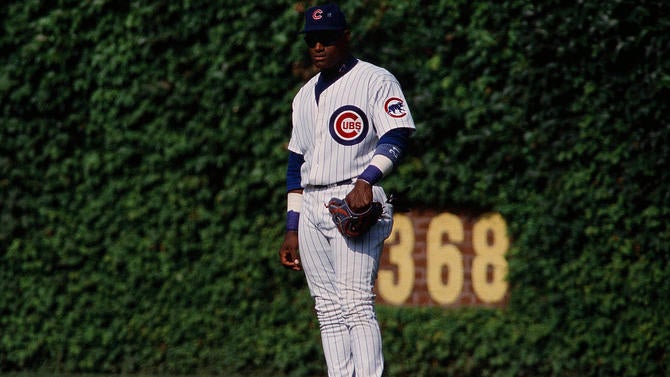
So maybe he was closer to one-dimensional -- but more like two- or three-dimensional -- during the amazing five-year power run and the following several seasons, but he wasn't before that. He just wasn't that great.
What if we go with the full body of work, though? After all, his career is complete.
Sosa was a career .273/.344/.534 (128 OPS+) hitter. He led the league in runs three times and got to 1,475 in his career (77th all-time). He didn't get to 3,000 hits, but 2,408 is more than nine Hall of Fame right fielders. His 4,704 total bases ranks 38th all-time, ahead of names like Frank Thomas, Mickey Mantle and Mike Schmidt. The 1,667 RBI are 29th all-time, topping sluggers like Willie McCovey, Harmon Killebrew and Willie Stargell.
And, of course, we have the 609 home runs. Only seven players in MLB history have more, and a home run is the best possible thing any player can do on a given pitch. Yes, it really is. Seriously, stop arguing.
The 234 steals is also a pretty good number for a power-hitting right fielder. For comparison's sake, Hank Aaron had 240 in his career. Gary Sheffield had 253. Larry Walker, Reggie Jackson and Dave Winfield had fewer than Sosa but more than 200.
Sosa won an MVP, finished second once and finished in the top 10 of MVP voting seven times.
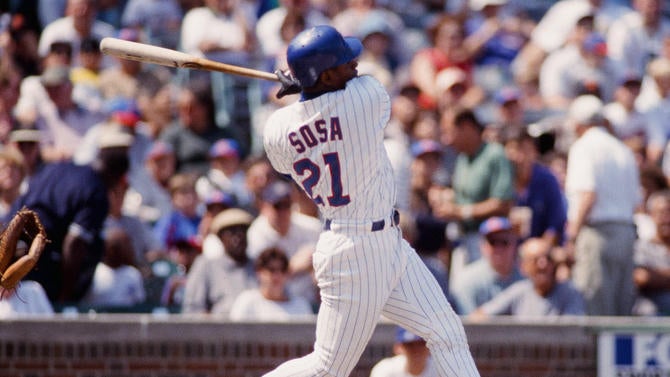
So what do we actually have here? It looks like a player with a very weird career that in totality has the numbers worthy of Cooperstown. Let's look at the advanced metrics.
Using JAWS, Sosa sits below average among Hall of Fame right fielders, but not off the charts. He's actually above Winfield, Elmer Flick, Willie Keeler, Enos Slaughter, Sam Rice and a handful of others. In raw WAR, he trails Winfield, but tops everyone else listed there and several others, sitting 23rd all-time.
Is being the 23rd-best right fielder ever worthy of Hall inclusion? Of course it is. There are 501 Hall-eligible right fielders. Sosa would be in the top 4.5 percent.
Further, what about the impact on the game? Some argue that the 1998 home run chase between McGwire and Sosa either "saved" or drastically heightened the popularity of Major League Baseball. He was also on the periphery of Bonds' pursuit of McGwire's record a few years later. This is the Hall of Fame, right?
Looking at baseball players through the mid-'90s to mid-aughts, few players were more recognizable as faces of baseball than Sosa.
I don't think a discussion like this should ever carry the day in Hall discussions, but if one is on the fence, shouldn't that be a boost? Like if you think Walker and Sosa are close for the 10th spot on a ballot, is it not reasonable to go Sosa because of his impact on the game in this time period?
I asked the question on Twitter, and "yes" won in a close one.
Does Sammy Sosa's "impact" ('98 home run chase) matter in HOF discussion?
— Matt Snyder (@MattSnyderCBS) December 28, 2016
Now, we're still left with the "character clause" stuff -- points 1-3 above -- and that eliminates him from contention for many Hall of Fame voters and non-voters alike. Notably we could even have some who would say Bonds and Clemens (and maybe even Ramirez) were going to be Hall-worthy without the juice but Sosa-the-monster was a total PED creation. I don't know how anyone could possibly claim to know such things, but to each his or her own.
We're also dealing with a very crowded ballot. Many would rank Sosa as the 12th- or 13th- or 14th-best candidate on the ballot, and with a 10-man limit, he's being left off.
Team these points with the mysteriously still-lingering Cubs exile and you have an afterthought of a Hall of Fame candidate. With 609 career home runs and everything else said above, it just doesn't seem to properly line up for me. Some, such as myself, might say he's now become underrated. It's remarkable how it's all unfolded.
Other Hall of Fame cases: Posada | Ramirez | Guerrero | Rodriguez | Sosa | Wagner | Sheffield





